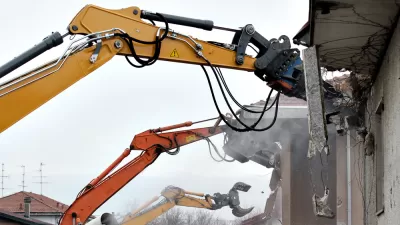It got more expensive to neglect properties in Washington, D.C. this week.
It will soon become harder for landlords to neglect vacant or blighted properties under a bill the D.C. Council unanimously passed today," reports Andrew Giambrone.
In effect, the measure implements higher property tax rates on vacant and blighted properties (5 and 10 percent more, respectively) "until owners affirmatively prove to the Department of Consumer and Regulatory Affairs that they've abated issues," according to Giambrone.
The measure is designed to respond to residents' complaints about the public health and safety issues connected to vacant and blighted properties. The idea is that negligent property owners and landlords will respond faster to the increased taxes. At-Large Councilmember Robert White also expressed the idea that vacant properties are a missed opportunity to provide shelter to the District's homeless population.
FULL STORY: D.C. Tightens Regulations on Vacant Properties

Planetizen Federal Action Tracker
A weekly monitor of how Trump’s orders and actions are impacting planners and planning in America.

Maui's Vacation Rental Debate Turns Ugly
Verbal attacks, misinformation campaigns and fistfights plague a high-stakes debate to convert thousands of vacation rentals into long-term housing.

Restaurant Patios Were a Pandemic Win — Why Were They so Hard to Keep?
Social distancing requirements and changes in travel patterns prompted cities to pilot new uses for street and sidewalk space. Then it got complicated.

In California Battle of Housing vs. Environment, Housing Just Won
A new state law significantly limits the power of CEQA, an environmental review law that served as a powerful tool for blocking new development.

Boulder Eliminates Parking Minimums Citywide
Officials estimate the cost of building a single underground parking space at up to $100,000.

Orange County, Florida Adopts Largest US “Sprawl Repair” Code
The ‘Orange Code’ seeks to rectify decades of sprawl-inducing, car-oriented development.
Urban Design for Planners 1: Software Tools
This six-course series explores essential urban design concepts using open source software and equips planners with the tools they need to participate fully in the urban design process.
Planning for Universal Design
Learn the tools for implementing Universal Design in planning regulations.
Heyer Gruel & Associates PA
JM Goldson LLC
Custer County Colorado
City of Camden Redevelopment Agency
City of Astoria
Transportation Research & Education Center (TREC) at Portland State University
Jefferson Parish Government
Camden Redevelopment Agency
City of Claremont





























